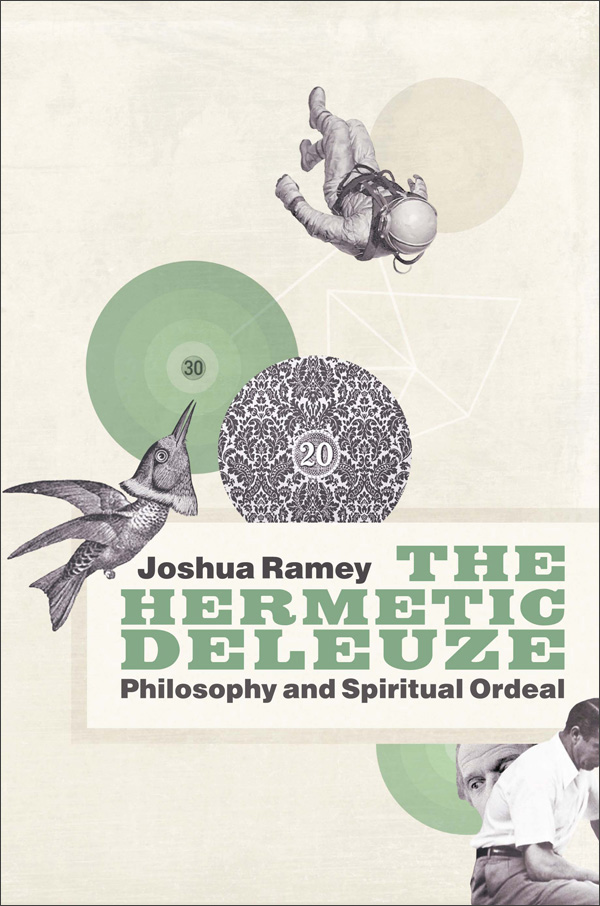What do you think?
Rate this book


304 pages, Kindle Edition
First published January 1, 2012
[More specifically, following Antoine Faivre, we can say that esoteric thought, writ large, "relies on three basic concepts: similitude, or the search for structural affinities; the participation of “entity-forces” in one another; and a view of nature as a composition of “concrete pluralities,” rather than as self-identical individuals.]As human beings we are called to enact this harmony in a conscious, redemptive process of learning that is simultaneously an embodying of the archetypal structure of cosmic reality. It is the exploration of transhuman, microcosmic, and macrocosmic principles as the fundamental determinants of human subjectivity. This experimental process is, in line with esotericist protocol, punctuated by spiritual ordeals. There is an important conceptual and practical resonance between an hermeticist view on the cosmos and the Deleuzian nexus of thought and immanence.
["We have seen Deleuze argue, for instance, that from an immanent perspective, nature and culture are crossed by a deeper “Unknown Nature” that connects the human to the animal, the social to the geophysical, the architectural to the cosmic, in a potentially unlimited multiplicity of ways. Deleuze and Guattari insist that from the perspective of a plane of immanence, boundaries between the animate and inanimate, human and animal, the living and the dead become imperceptible. In this view, there is thus a kind of “ecology of the virtual” deeper than the divide between the living and the nonliving, an ecology as much of the artificial as of the natural. And through experimental exploits in art, science, and philosophy, this deep ecology can be activated."]'Thinking' in its most general manifestation as an experimental practice, is for Deleuze always a journey, a process of production, a "force of the cosmos". Ramey writes: "In his late work, Deleuze emphasizes repeatedly that the renewal of belief in this world is the very definition of thought: “It may be that believing in this world, in life, becomes our most difficult task, or the task of a mode of existence still to be discovered or our plane of immanence today” (WIP, 75). Deleuze and Guattari even argue that thought itself requires a kind of conversion. This convertio (turning) is not away from the world, but toward it. It is an “empiricist conversion,” a kind of restored vision that rediscovers the world with its “possibilities of movements and intensities, so as once again to give birth to new modes of existence, closer to animals and rocks”. It is this inchoate aspect of reality that is a reflection of the ontological immanence at the heart of Deleuze's philosophy: the world has taken on the attributes of God, transcendence has been totally absorbed into immanence.
[By the way, the passage quoted above uncannily resonates with what Martin Savransky, who orients himself on William James, writes in his book 'Around the Day in Eighty Worlds: Politics of the Pluriverse': “... trusting the possibility of another world underway and yet-to-be-made is vital, perhaps even the most vital function that our lives in this world might have to perform. But it also makes present that doing so authorizes nothing. It provides no definition of how the good common world ought to be, and it warns us against giving in to the temptation of dreaming of a world that, once made, would bring the facts of struggle to an end. The pluriverse must be made, even when it won’t get made. Indeed, it is almost as if the vital task of composing other worlds in the wake of what has happened to us would only succeed, as sheer activity, by espousing as a political vocation the indefinite failure that simultaneously upends and subtends its project. As if taking the risk of setting out to fail might one day, by apposition rather than opposition, turn failure into its opposite, linking the imperative of struggling for another possible world with the very insistence on staying alive to an ongoing experimentation with worlds in the making. Such is the insistence of the pluriverse in the still of the night, gaping open the world on the edges of every world-vision, drawing it into the hold of perhaps.”]Contemplating these reflections the connection between 'thought' and spiritual ordeal becomes plausible. Ramey: " ... religious faith is no longer the paradigm of belief. The model, rather, becomes the ordeal—at once epistemic and ethical—of living in a world whose ultimate structure remains inaccessible to thought, and yet forces thought to conceive it ..." 'Thinking' is delving into this inchoate ground and this is always 'a wager', is never risk-free. It is a 'pragmatics of the intense' that we see practiced by certain philosophers (Spinoza, Nietzsche) and artists. It constitutes a renewal of life itself which aligns with the hermetic practice of transformation, known as 'magia naturalis'.